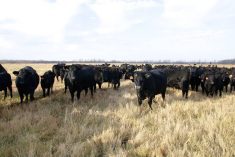I encourage all producers to share their knowledge with cattle associations, researchers and related professional organizations because positive results are eventually returned. Accurate data going in leads to accurate data coming out.
We may be inundated with surveys and questionnaires from industry groups but their ultimate goal is to gather information that will inform producers and provide direction for the industry — or maybe a direction to avoid.
The industry does not have that many requests and I encourage producers to simply ask about the details and time commitment required. Often questions can be answered with some thought and a records check.
Read Also

VIDEO: Ag in Motion documentary launches second season
The second season of the the Western Producer’s documentary series about Ag in Motion launched Oct. 8.
If you answer a survey or sign up for something, take the necessary time and give additional comments or information where appropriate. There may be financial gain or reward for completing it, which might encourage completion, but consider also whether the results could benefit the industry and your individual farm or ranch.
Over the years, I have participated in many surveys from the veterinary side; things like which antimicrobials to use in certain situations or which insecticides. They are more frequent when a new product is about to be developed or when manufacturers are determining a potential market need.
Requests also come from nonprofits and national or local cattle organizations, which have the needs of cattle producers at heart. The more producers who respond, the more accurate the data will be.
I know the internet and contact lists seem to fuel these queries. If in doubt, check to make sure the information is going to a source you know.
The Beef Cattle Research Council recently sent a request for participation in a surveillance study for Canadian cow-calf herds. If you come across this opportunity, take it. You provide information from your own herd, anonymously, and you have the opportunity to see overall results when the study is done.
One can see regional differences and how management systems differ across Canada. There is always an opportunity to learn from others but there is also the satisfaction of giving information that may be valuable to others in the industry.
I believe many in the cattle industry do help their fellow cattle producers whenever they can. We are all in this together and if one does well, then all do better. Tips and tricks of the trade, new advances, improvements in gain or in animal welfare handling all are worthwhile.
Lots of research dollars are now being put into the theme of global warming and how cattle and methane production may contribute to this. I firmly believe researchers will find ways to test for this and improve it, all while finding improvements in other areas of cattle production.
I’ve found no one who regrets being involved in these projects, even to the point of volunteering in many things cattle related. They feel they get good exposure down the line.
Let’s all welcome the many ways we can get great information from the industry in the form of webinars, presentations, one-on-one encounters and dealing with agricultural professional people. They all contribute a tonne to the industry. Keep the agricultural community involved and don’t be afraid to share enthusiasm with others.
Watch for organizations like the BCRC, Canadian Cattle Association, various breed organizations, provincial cattle associations and researchers who ask for your contribution. Young and old, experienced and inexperienced, purebred and commercial — all have lots to contribute and we all learn from each other.
Roy Lewis works as a veterinarian in Alberta.

















